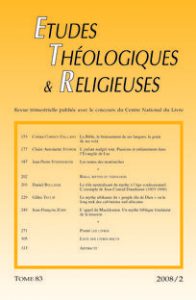Chaque confession réclamant pour ses certitudes particulières une validité universelle, c’est surtout la concurrence des convictions qui, à l’époque moderne, apparaît comme générale et commune. Dans cette compétition globale, les tentatives de recourir au mythe pour rendre plausible par une narration contingente une vérité supra-individuelle s’avèrent à long terme illusoires. Daniel Bolliger en trouve un exemple éclairant dans l’utilisation du mythe d’Œdipe par le luthérien strasbourgeois Jean-Conrad Dannhauer (1603-1666) : loin de renforcer la validité des convictions confessionnelles, l’incantation du mythe débouche sur un appel indirect à une raison humaine dont le caractère transconfessionnel annonce déjà la théologie des Lumières.
In the global competition that religious confessions had to face in the seventeenth century, some theologians have used classical myths to make plausible the claims of their own church to some universal and transpersonal truth. But far from fostering the value of confessional convictions, such endeavours paved the way for the Enlightenment. As an example, Daniel Bolliger shows how the Lutheran theologian Jean-Conrad Dannhauer from Strasbourg has used the myth of Oedipus to prove that it appealed to some transconfessional form of human reason.
p. 203-226
Auteur
BOLLIGER Daniel
Daniel BOLLIGER a enseigné l’histoire du christianisme à l’époque moderne à l’Institut protestant de théologie, Faculté de Montpellier.
